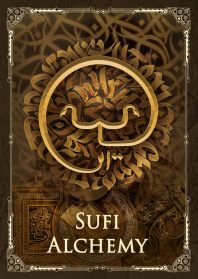Sufi Alchemy

Sufism is not what impresses, but what prompts you to start searching.
Shaaban
Sufism is a path that leads to purification and absolute purity. For some, it is complete, independent and indivisible, for others it is part of Islam, or even the language of cultivation and perfection.
In any case, Sufism is perceived as a chain, as a path of development, and it would be interesting to examine the Sufi tradition from such a perspective, taking into account its mentality. It is this mentality that places Sufism within a given social or cultural context, due to its similarity to other ideas. In certain traditions it is more prominent (e.g. in Afghanistan or Yemen), whereas in others it lines up with other existing conceptual trends (e.g. in India and China). Its most prominent feature is that it manages to absorb various spiritual principles and doctrines, without attempting to oppose or modify them.
Sufism, or tasawwuf, requires man to perfect his spiritual world. Sufism has its own inner dimension associated with the acquisition of purity. Sufism is a carpet woven from doctrines and practices and stitched by masters who cherish the nature of purity.
The greatest challenge in understanding Sufism is related to the fact that this doctrine is inherently linked to the Islamic mentality and spirituality. However, it is often understood by people with a different mindset too. Sufism fascinates not with its faith, but with its actions. Some perceive it as a religion, while others do not. Of course, it is much easier for a person of Islamic culture to comprehend and study Sufism than it is for people with a different religion or culture, because the language of Islam is similar to that of Sufism. Moreover, Islam considers Sufism part of the religion, which, of course, is the case according to the teachings of most of the Tariqats (Sufi schools). However, Sufism also includes trends that are not based on the traditional genealogy, but on the practical essence of Sufism.
If we look at Sufism as a practical path, regardless of whether we are immersed in this tradition as its followers, we will discover that it is really versatile and has an impressive scope. Even simply acknowledging this path is a lot, especially in today’s world where much is denied only because of the habit of denial. Moreover, disrespect or denial of Sufism would mean denying many moral laws. Note that when embarking on the path of Sufism, you should prepare yourself for certain requirements and efforts, and for regular work on yourself.
Historically, Sufism existed in the form of various schools and methods of development (tariqats), as the veneration of various saints (wali), or in the form of learning from masters who seek and find their baraka (grace) in spiritual revelation.
However, if you want to achieve the mystical truth, you need to change a lot in yourself, and this is the highest truth of Sufism, which focuses on following the path, the tariqat. The extraordinary experience of Sufism is defined by states of mind that are similar to the state of mind brought up by tantra. This helps classify the Sufi path followers not according to their ideology, but according to the state of their consciousness. In addition, the educatedness of the Sufi follower is also important, for those who do not achieve inner revelation, cannot attain harmony, but slide into radicalism instead.
Following the path of the tariqa, we acquire a discipline of actions. It is not easy to walk the distance from the exoteric to the esoteric (hakiki) perception of the path. Attaining the purifying light (marifa) is crucial for the Sufi path, and the knowledge and use of this light is associated with the Sufi idea of transformation, with Sufi alchemy. A key element of walking the Sufi path are the so-called “stations” that draw our attention to the obstacles in our mind. Since the level of consciousness is different in different people, it is difficult not only to perceive, but also to imagine the first stations of the path.
Sufism has many variants from the standpoint of external knowledge. It is either the path of hermits, the path of dervishes, or the life of a traveller who lives at the behest of his mind and heart in society, or the life of the ascetics who live among other people, and are part of their culture, which is especially typical for the Arab countries. Anyway, we can say that all Sufis are united by dhikr – the practice of supreme revelation and reunification with knowledge. This knowledge is important not only for adherents of Islam, but also for followers of other forms of spirituality.
The knowledge of dhikr is the knowledge of the direct path that connects us to the higher mind, and many Sufi practices are based on the task of building this connection. This path introduces the concept of “tasawwuf”, which is extremely important for understanding Sufism and is practically synonymous with the life of a Sufi, since a Sufi is the one who possesses the Sufi mentality, the Sufi power. Without the knowledge of tasawwuf, this is impossible.
Speaking of Sufism, we must take into account the fact that various approaches lead to various interpretations of the same concepts. This makes the path really important as it determines the sequence of actions; for even the right words can interfere if they are not learnt at the right moment and at the right time. Talking about Sufism today, we must consider not only the various aspects of the path, but also take into account the influence and interpretations of the Druze, Janissaries, Mamluks, and even the dervishes themselves, who seem extraordinary to the outsider. Either way, Sufism is a doctrine of spiritual realization. And the viability of this path depends on the implementation of personal efforts, and our ability to believe not just in something but believe in ourselves.
Obviously, Sufism was initially a type of search for power. During the period between 10th and 13th centuries, there was an unprecedented rise in the search for knowledge, even a struggle for the possession of knowledge, which changed the mentality of the entire civilized world. For example, at a certain stage, the Knights Templar and Sufi orders united in search of the sacrament of illumination, which reinforced the accumulation and unification of the knowledge of Platonism, Judaism, Gnosticism, Kabbalistic, Buddhism and Zoroastrianism. Moreover, it seems this synthesis did not occur by chance, but according to a carefully developed plan – something quite typical for the true genealogy of Sufism.
So, the path of Sufism is, first of all, a practical path that requires diligent work on oneself. No matter how true and clear the theory sounds, only practice can clear Sufism from all unnecessary ideas.
This is a mandatory condition for Sufism, there are no simple concepts in the tariqat. Sufism is not a doctrine for demonstrating who you are, it is a doctrine of constancy.
In addition, we must also remember that the mentality of the early Middle Ages was quite different from today’s way of thinking. Of course, you can go to Afghanistan and become one with the unchanged essence of things, but you must also understand that humanity has changed in its mentality, therefore the greatest challenge is not to preserve the spiritual lineage of Sufism, but rather to maintain a mental connection with oneself.
Of course, those who truly follow the path or have grasped this spiritual connection within the tradition of the orders cannot be judged or evaluated. However, let us admit that most modern Sufis and their supporters do not belong to any orders, because they haven’t established a spiritual connection yet, or simply because their mind is not ready to or cannot understand this path.
Today, Sufism is more like the threshold at the gates of freethinking. Yet since this opens up the opportunity for everyone to embark on the path of improvement, Sufism has a special value for the people who seek it. Sufism is an applied science aimed at purifying and transforming the heart and soul. It requires that we not only understand but master the conditions that lead to understanding, which means that we need to develop, harmonize and learn to focus our mind.
For me, Sufism is a Gnostic doctrine, a path to knowledge, which focuses not on the letter of the law but rather on the effort used for understanding this law. Therefore, the goal is not to acquire wisdom, but to develop the effort needed to cultivate wisdom within oneself. This helps us to achieve the most important goal: not to destroy the small. Once we learn not to destroy the small, we cannot destroy the big.
This is in a way the doctrine of the “hidden Imam”. We must note that over time, society changed, people became more dependent on external resources, and stopped following the true example and laws. Although Sufism is a doctrine directed at achieving a timeless state, a doctrine focused on the concept of transformation, with time and under the influence of orthodox religious institutions its goals and tasks have changed. The truth of Sufism is in merging with one’s passion, the power of supreme ecstasy, the intoxicating penetration into the true self. And, of course, if we are unprepared for the transformation, we cannot understand the path and our universe gets undermined.
A Sufi is a person who knows himself and has ensured his inner self-realization.
Shaaban
Sufism is the devotion to knowledge and self-improvement; it is a path that brings us closer to the supreme. Of course, since today Sufism is squeezed between Western rationalism and Islamic fundamentalism, there are numerous interpretations of its concepts. This increases the strength of Sufism and also prevents all attempts of encroaching on it ideologically. The mere fact that Sufism has a mystical and ascetic aspect, associated with the purification of the inner essence, shows that this is a spiritual path. So, if we want to truly understand it, we must practically walk this path, and not just reason about Sufism philosophically, as what is at stake here is the experience of higher connections.
For the Sufi, Tasawwuf is the practical science of the soul. This science is, of course, also an integral part of Islam. And although one cannot be separated from the other, let us try and side with those who have other religious ideas. What is more, many people live not following the prescribed. Note that along with the vertical axis of mystical experience, a horizontal axis also exists and it was quite reasonably defended by Idries Shah, who, together with Gurdjieff, led me to Sufism, which for a long time existed in my mind as an elusive reality. What is important in Sufism is that it is not static and also it is primarily guided by method rather than doctrine. And this is crucial, at least for Western thinking. Otherwise, how could we possibly appreciate the multi-level essence of the Sufi path. Yet first, we need to follow this elusive reality. Indeed, for many people it is important to accept Sufism as a formula of spiritual wisdom, and not as a religious concept. For example, Gurdjieff’s philosophy can be seen as the task of finding the miraculous. Even starting this search is not easy at all. It was this search that created in Gurdjieff a craving for Sufism – not only in him, but also in many of his followers.
Before we believe in the knowledge, we must believe in searching.
Shaaban
Sufism is not what impresses, but what prompts you to start searching. This search allows you to learn and work on yourself. Sooner or later, this path will lead to knowledge, just like it led Gurdjieff to the Sarmung Sufi brotherhood. The one who searches, sooner or later, even if he does not join the tariqa, will join its essence.
After all, what Gurdjieff developed, and I would say, instilled in his followers, is a system that originated in Persia and Zoroastrianism. He instilled a path, if not to the knowledge of Sufism, then to its search. The path of Gurdjieff is above all baraka, the path of grace, a path leading to a permanent spiritual presence.
Baraka is appreciating the significance of your spirit, understanding the true power of your higher self. Receiving and transmitting baraka is important in Gurdjieff’s philosophy and practical concepts. It is linked to the idea of harmonizing your nature and its connection with the higher essence. Only, instead of dhikr, the highest harmonization is achieved through the Enneagram of the Fourth Way. In fact, the great Sufi Rumi introduced the technique of Sufi rotations following the same approach.
Or let us recall, again, the approach of Idries Shah, linked to the idea of constantly keeping in the mind and analysing the higher truths.
The reasons that mislead you have their reasons.
Shaaban
The heritage of Sufism belongs to all mankind. One can follow the spiritual alchemy of the Arab philosopher and scholar al-Ghazali, love the satire of Haji Nasreddin, immerse oneself in the poetry of Omar Khayyam’s ecstatic rapture or in the philosophical and psychological quest of Idries Shah, or study the works of the alchemist Jabir ibn Hayyan.
Their works, like many others, are components of Sufi alchemy. Those who strive to understand Sufi alchemy need to understand both the rationality and the irrationality of this path. Sufism is an experience, which is generally not suitable for ordinary people, because a lot of its phenomena must be compared and separated from each other. It is impossible to believe in Sufism, as Sufism is a technological process for cultivating spiritual strength, spiritual power, if you like.
These thoughts are also part of Sufi alchemy, and I have been taught that Sufism must not be perceived in a linear or reactionary manner. For me, Sufism is the formula of wisdom. And whether it preceded Islam, was formed outside of it, or is its integral part, is not important. Each of these concepts can encompass a lot. Yet irrespective of how we view Sufism, it is fundamentally linked to Islam, and there are no questions about this. But there are, as I have already said, people outside of Islam who feel close to the fundamental spirit of Sufism, as well as its ability to purify and gain inner freedom. This is why I welcome all unpretentious reflection on the topic of Sufism, regardless of the attitude to its spiritual lineage. People need to cultivate their minds; therefore, they should not ignore all the wisdom hidden behind the concept of Sufism.
The sea is one, but its waves have different shapes.
Shaaban
Sufi alchemy is a true treasure for the human mind. A person who is not familiar with, say, Rumi – he is destitute! How could he overcome time and space? Sufism is the path, and mentors are needed to support this path. Knowledge is the supreme goal. The question is: How do we broaden knowledge? Knowledge is what develops the mind of the person, otherwise it is a cult. To respect knowledge means to comprehend it, and not just bow to it or accept it without questioning.
In today’s world, where people have limited learning and perception abilities, Sufism remains one of the effective methods for focusing the person. The primary task of Sufism is to enrich the mind through the tasks of the path. If there is a problem in the understanding of Sufism, then it lies in the way we operate with knowledge and the mind in general (which, by the way, is important not only for students, but also for teachers).
How can a person with a weak mind comprehend the methods of a spiritual doctrine, or matters of psychology, physiology, and energy; even after going through the path of purification? A weak mind always relies on a false or weak self.
The current state of mind of people joining Sufism endangers Sufism itself, this is why today one must first accept this concept before moving forward in their search or accepting a certain definition. The special language of Sufism plays a very important role here. For the Sufi, each word is the essence of knowledge, and not a fragment of the truth, it activates the possibilities of attaining wisdom, and does not lead to psychological entertainment that diminishes the possibilities of cognition. Psychological entertainment has a subject – esoteric entertainment, that is, the pleasure we gain not from knowledge, but from feeling a part of it. Therefore, until we understand the direction of our search, the light will not help us.
Enumerating the qualities that a person should possess does not mean you possess them.
Shaaban
Stop finding flaws in others, learn to find them in yourself! For modern man, the incomprehensible is linked to a natural reaction that leads to irritation. This dictates one’s behaviour, making it impossible for the person to understand the basics, due to mere lack of willingness to do so.
It is a mistake to think that Sufism is some kind of magic wand or trick that will do the work for you. The work of the Sufi is personal, painstaking and daily. Practicing Sufism is a challenge, but it is also the most important aspect of the daily life of a Sufi. Sufism relies not on certain techniques and exercises (which, of course, it also uses), but on the way we build or transform ourselves, weaving the Sufi carpet of knowledge every day.
Sufism is a way of thinking; it is the ability to operate with your brain and to maintain the effort of studying. That is why even one parable or story can become a source of knowledge for the Sufi. The universal nature of Sufism is for all those who want to understand development in general.
Anyhow, Sufism is a unique tool for awakening people, which Osho Rajneesh used very skilfully to draw attention to and instil respect for Sufism. Sufism is not a closed doctrine; it is a hidden wisdom. The only question is: Who interprets it and how? We must not limit our understanding to certain dogmas, but instead we should find a way to follow the path that would fill us with content. Sufism reveals the individuality of a person by focusing on valuing life in spiritual purity. What is attractive in Sufism is not its secrets, but this work on self-improvement. Of course, we must also understand the Sufi tariqas, especially if one of them lacks support.
Naturally, every person who studies Sufism is always on the verge of drifting into pseudo-Sufism, because pseudo-Sufism is a derivative of the path of the Sufi. No matter how much you practice Sufism, without the concept of purity you are a pseudo-Sufi. Like all the pseudo-yogis, or pseudo-tantrics or pseudo-taoists, who do not understand the essence of the doctrine, but have decided they belong to it.
In spite of all the differences on the path of knowledge, the primary task of each path is to help you achieve a harmonious state. This is, in fact, a litmus test for any doctrine. This is why, sometimes we must not look back or forward, but at the present instead. Remember that for the beginner all concepts seem like pseudo-concepts, as he still has to develop an understanding for them and incorporate them into his mentality and analysis, instead of being absorbed in the idea of getting closer to the secret.
The Sufi is consistent in his deeds and thoughts and works constantly on himself. The secret of Sufism is simple and it lies in the constant studying of the secret of Sufism. This studying will help us acquire the Sufi thinking. Of course, the methods we use for unravelling this mystery are also important. And if we do not understand what is said to us, then we are not using any methods!
Note that even misunderstanding or rejection can become a passion and interfere with the purification of the self. Only by purifying ourselves, we open the way to perfection. The perfect person in Sufism is called “insan kamil”, or “al-Insan al-Kamil”, and achiving this state is the main goal in Sufism. The Sufi crystallizes himself on the path of perfection, he is able to sublimate the light into the amber of knowledge, achieving complete purification of the body and mind. This is a very subtle, but not a fragile state, it is an experience that cannot be described with words.
Since in our quest for knowledge we are often faced with the reflection of knowledge and not true knowledge itself, our primary task is to avoid interpretations and gain direct access to knowledge. However, Sufism has its own language, which is quite difficult to understand – a challenge that is necessary for keeping the mind in tune with the Sufi sphere of existence. This sphere of existence or the ability to be loved is an inexplicable concept, which is typical for the Sufi state.
To reach this state, the Sufi must not renounce other states, but transform them. It is impossible to become a Sufi without learning how to overcome oneself, how to ascend to the truth. The tools used here must make every mistake beneficial, as there is no direct path: Sufism is a spiral that we must first approach. Yet, even if the spiral of Sufism is the same for everyone, there are many different approaches to it, depending on various conditions, e.g. why, how and for what reason we have approached Sufism.
For me, Sufism is in serving knowledge, then space, and then the Supreme. We must build our own universe, and not advocate something we do not understand as this is in fact disrespectful for the universe. Sufism, like many other traditional systems of development, while maintaining its continuity, is in different states: it changes turbulently and is also constantly present (say, in Afghanistan). Be that as it may, the knowledge of Sufism is impossible without understanding that this is a timeless concept, a constant fire, a need to improve your spirit.











